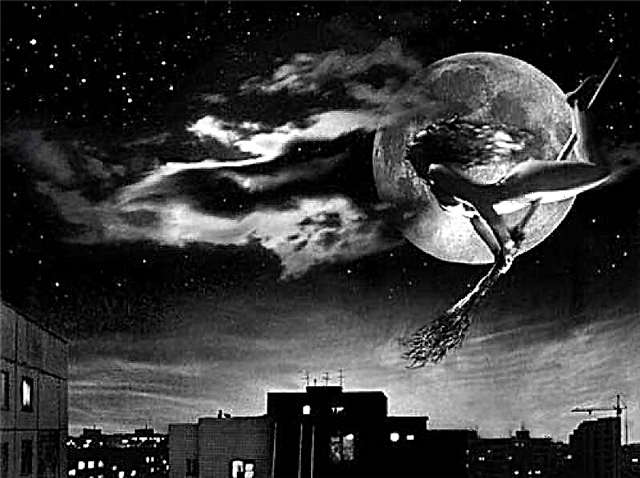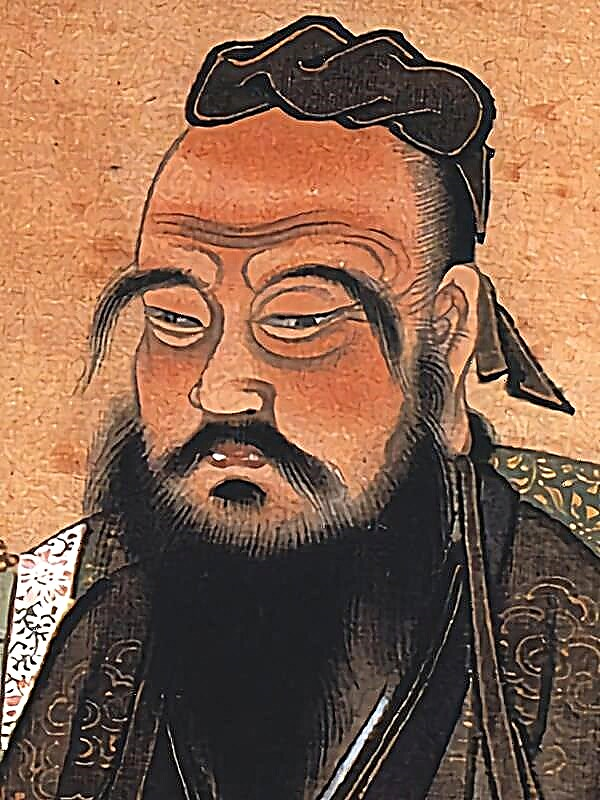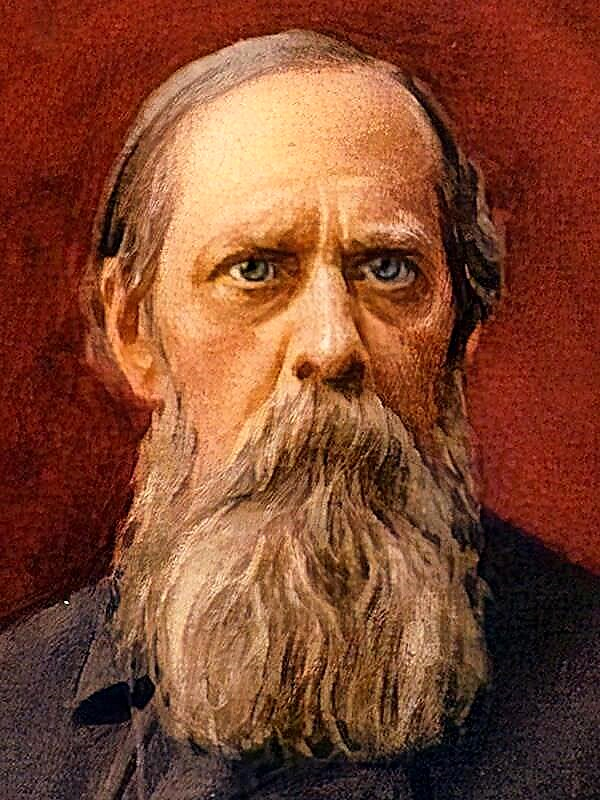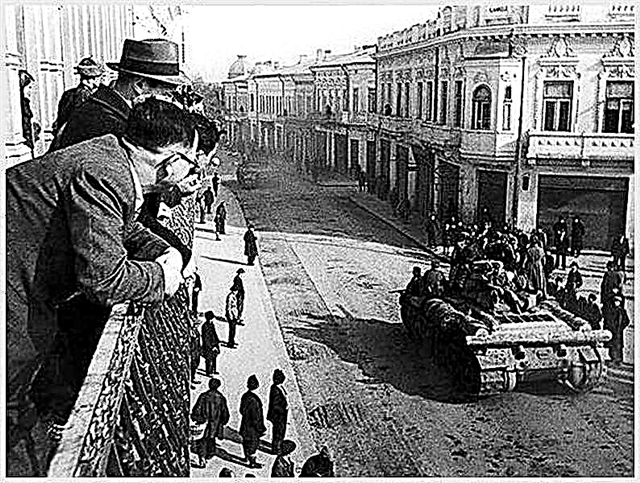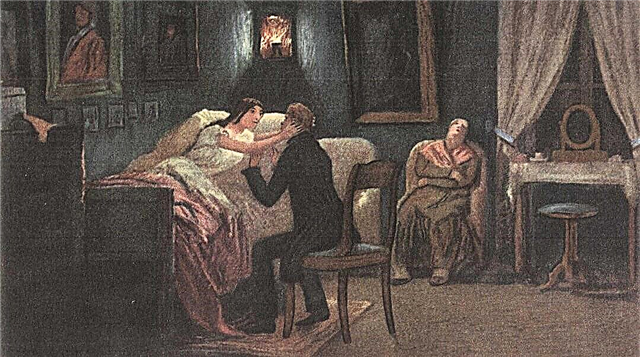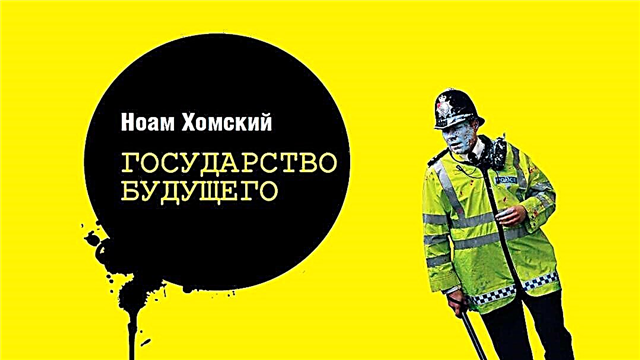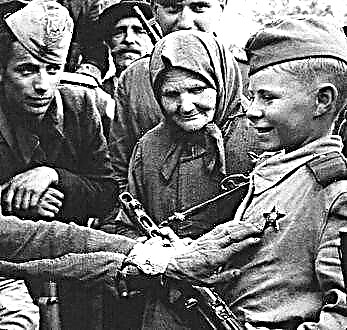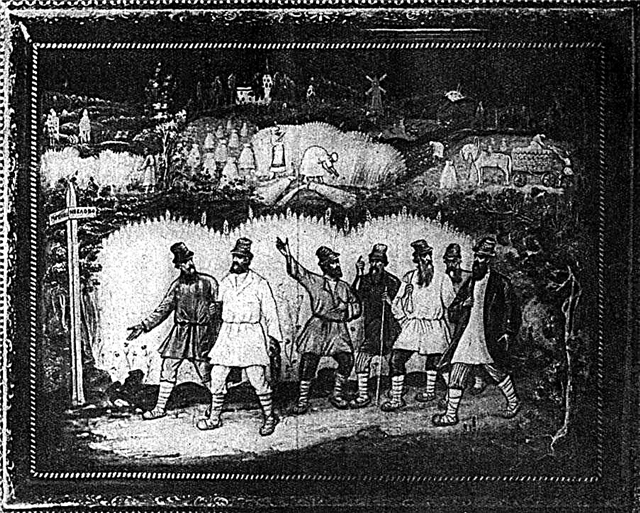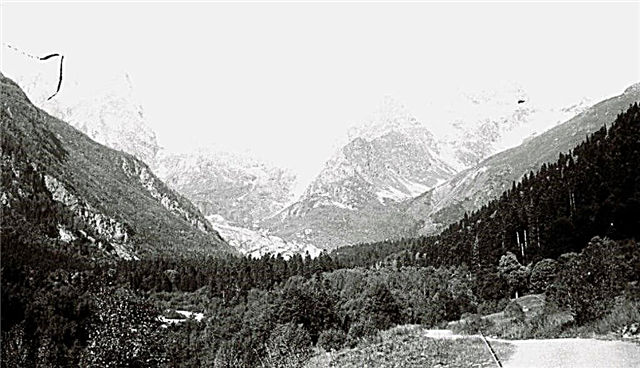The secretary of the Arab wizard Malikulmulk, who printed his correspondence with the spirits, assures us that this is a very interesting book. For the most part, spirits are very kind creatures, they just don’t like hookers, money-lenders and hypocrites, and they don’t favor dandy, red tape and revelry, and therefore they can’t get along in the present light and prefer to be invisible. This allows them to learn the biggest secrets, steal the most important papers and tear off masks from hypocrites, which is why the shadows that come to the other world feed on them petition to Pluto. The secretary Malikulmulka notifies that he printed these letters in debt, because the place of the secretary in a learned person is unprofitable. Those who wish to have and read these letters should send money to the Sveshnikov bookstore in St. Petersburg.
Secretary Malikulmulka tells the story of his acquaintance with the Arab philosopher. One day he was returning from Mr. Pustolob, who, for the hundred and fifteenth time, courteously told him to grant him tomorrow. The poor fellow was so annoyed that he would prefer to deal with the devils and sorcerers, but not with the stupid nobles. Suddenly he heard a voice that belonged to a gray-bearded old man who called himself the wizard Malikulmulk. The old man offered him the place of his secretary and invited him to his possessions, located under Mount Etna. The poor fellow agreed to become the secretary of the wizard, but with the condition not to leave his hometown. He asked Malikulmulk to settle him in a good house. In response, the wizard rubbed his eyes with a hollow epancha - and the old pimped seemed to the secretary as a palace. But when the secretary wanted to invite his rich and arrogant acquaintances to dinner, the magician said that in their blindness they would see only a miserable home and that the secretary should enjoy his wealth alone. Malikulmulk said that he has many friends living in different parts of the world. He is already old, and the secretary will have to read him their letters and write dictated answers. The wizard allowed the secretary to write off letters that he liked and publish them, which he took advantage of.
Gnome Zor writes Malikulmulk from hell, where after a six-month absence Proserpine returned. Pluto, impatiently awaiting the return of his wife, was struck by her appearance: she appeared in a hat with feathers, high-heeled shoes and a fashionable French dress. The inhabitants of hell found Proserpine crazy. She wanted to shave Pluto's beard and dress him in a French caftan, and also demanded that a hairdresser, tailor and merchant of haberdashery be ordered. Gnome Zor sent to earth with the order to recruit the best craftsmen.
Sylph Dalnovid, flying through Paris, writes Malikulmulk about the greed of the merchants, about the carelessness of the sovereign, indulging in amusements and ruining the country, about the vain aspirations of the courtiers, about the ambition and stinginess of spiritual persons. People seek their pleasure in things that are vain, unreasonable, and transient; therefore, instead of true bliss, consisting in love for virtue and peace of mind, they find only inconstancy, boredom, envy, crime and remorse that make them unhappy. In the next letter, Sylph Dalnovid admits that he not only excuses, but even approves of the misanthropes' actions and way of thinking, because they depict the vileness of human vices and taunt them, thereby contributing to their correction and benefiting society.
Gnome Burisgon tells Malikulmulk about further changes in hell made by Proserpina.She staged a dance ball where judges Radamant, Minos and Eak laughed so much when they saw Alexander the Great, Caesar, Pompey, Brutus and Themistocles dancing with the Roman vestals that they were seriously outraged, and there was no one to “send judgment on the shadows hourly arriving in hell. ". Hippocrates, whom they sent to examine, reported that two of them were crazy, and the third was deaf. Pluto sent the gnome Burisgon to earth with the order to find three honest and impartial judges to administer justice in hell. Diogenes advised Burisgon to fly to the north, where, according to rumors, loafers and hookers were kicked out of orders.
Astarot writes to Malikulmulk that he spent more than two months in Paris because he was called to help by a poor poet, who composed many odes and madrigals to various noble persons, but who did not acquire not only wealth, but even prosperity. Astarot asked why the poet did not choose another field, because it is better to be a well-fed cab driver than a hungry poet. The poem was offended by such an assumption: he puts poetry above all else and recalls Scaliger, who said that he would be more willing to agree to be Horace than to the King of Naples and Sicily.
Gnome Zor complains about the difficulty of the commission given to him by Proserpina. Zor began to purchase outfits, but, about to send them, he always found out that they were out of fashion: what everyone liked yesterday, now caused general ridicule. He talks about a meeting with Buriston, who does not succeed in fulfilling Pluto’s errand.
Sylph Dalnovid in the next message describes the conversation he heard from Mrs. Plutana with young Lizanka. The old woman persuaded the girl to be more favorable to Mr. Rastochitelev, seducing with rich outfits and generous gifts. She taught the virtuous Lizanka that it is better to be rich and unchaste than poor and honest, and cited her as an example to Lyubostrast, who never thought of chastity. Seeing the girl’s indecision, Plutana promised her to be present at her meeting with Mr. Rastoichitelev and not to leave them alone.
Sylph Svetovid is surprised at the ignorance of the nobles who despise science and consider it useless for society. The petimeter, with its curvature, seems to him like a monkey, and its tongue, teeming with expressions such as “hairdo”, “curly hair” and “ribbon bow”, is completely unintelligible.
Having assumed a human appearance and posing as a village nobleman, the dwarf Zor made friends with Vetrodum and Prypryzhkin, young loafers who know how to kill time.
Prypryzhkin praised Zora masquerades and took him there with him. Zor sees that fun, joy and freedom are only appearances, and in fact, these meetings "only contribute to deceiving husbands, robbing someone else and doing tomfoolery." Another time, a friend took Zora with him to visit the wealthy merchant Plutarez, who owed a large sum of money. Guests asked Plutares where he intends to identify the undersized son. The courtier, who considered himself a close friend of the merchant because he was not ashamed to borrow money from him, offered for twenty thousand to help the boy make a career and eventually bring him into the big light. The military man for a certain bribe was ready to enroll the boy in his regiment and take under his protection. Judge Tikhokradov for several thousand would take him in his order and help to become a judge. But the owner replied that he prefers his fortune to everyone else and wants his son to follow in his footsteps. Although he is not a nobleman, money replaces everything with him. Zor saw that the merchant was telling the truth: he lived like a little king, and every day everyone looked for him in "favor".
Gnome Buriston does not hope to return to hell soon: for every thirty thousand inhabitants there are twenty thousand judges, but it will take five hundred years to find at least one honest one among them.He sees how the judges, without even hearing the excuses of a thief who stole a handkerchief from a rich man, condemned him to death, and only the intercession of another rich man who had committed many crimes, but wishing to be known as merciful, saved him from death.
Sylph Svetovid, taking the form of a noble traveler, decided to live in one city for a while. Studying the customs of the locals, he noticed that their courtesy and courtesy were nothing more than pretense, that trickery replaced the place of truth, and tenderness was the place of honesty: everyone was talking about each other's eyes and praising each other beyond measure .
Gnome Zor, who understands the conversations of not only people, but even inanimate objects, went into a fashion store and heard there a dispute between an English hat, a dead cap and a French talk about which of them is more important. When the scarf woke up, everyone attacked her, reproaching her indiscretion, but she justified herself by giving way to the daring hand of the admirer, only saving her life: if she starts to resist, the mistress’s admirer can tear it to shreds. The conversation was interrupted by the appearance of several goldfinches who purchased all the debaters and debaters.
Mr. Buriston had a chance to attend a theatrical performance. In the description of the play, the content of the tragedy of a long-time enemy of Krylov, Y. Knyazhnin, “Rosslav”, is parodyed. Sylph Svetovid also visited the theater, but did not hear the play at all, because the audience sitting in the boxes with their loud conversations drowned out the voices of the actors.
Prypryzhkin shares his joy with gnome Zor: he will marry a rich woman, and now he will have a train of horses, a dancer and a beautiful pug. He had not yet seen the bride, but he knew what dowry was being given for her, and hoped to spend part of it on the upkeep of the dancer. But it turns out that the bride of Prypryzhkin Neotkaz is not as simple-minded as he thought, and in addition is also stingy. Having married, she shares not only her, but her husband’s income in half with Promot, who crept into trust in the stupid Prypryzhkin.
The dwarf Vestodav informs Malikulmulk of further changes in hell. Proserpine makes Pluto drink wine, saying that it is impolite to refuse to drink for one's health. Pluto has to administer justice himself, but Proserpine always distracts him, arranging balls and festivities. The first person in hell was the dancemaster Furbinius, and Proserpina demands that everyone learn to dance, because dancing is the most respectable occupation.
Sylph Dalnovid notices how great the difference is between "an honest man, revered as such by philosophers, and an honest man, the so-called in society." In another letter, he regrets the people who spend their whole lives idle, believing that such a useless life they liken themselves to "senseless cattle who, without any thought, indulge in sensory pleasures alone." Idleness, in his opinion, gives rise to ignorance and arrogance.
Gnome Burisgon is perplexed: why “many horses carry one man on him, who‹ ... ›he walks very pretty; but, on the contrary, as many people drag a heavy stone, how many horses can lift it with a number? And wouldn’t it be better if, having harnessed from these boxes, although several uselessly harnessed horses, to use them to help these poor fellows carry a stone? ” In the reception of the nobleman he sees many petitioners, whom the nobleman hardly deigns with his eyes. One of the petitioners - the writer - explains to him that the works of Plato are read by merchants and bourgeoisie, and the nobles read only fairy tales and humorous fables. The authors present them with their works in the hope of rewarding, and if they do not receive it, they write satire on them, and although the nobles do not read them, the authors, like small children, think that spitting on a pole that they hurt is enough for him avenged.
Gnome Zor, walking around the city, enters the bookstore and opens the volume of the works of Rifmokrad (J.Princess), which seem to him to be bad translations.
Gnome Buriston was delighted to think that he had found a fair judge, because he had decided the case in favor of the poor widow, although her rival was a rich man, married to a young beauty. But it turned out that the widow’s sister serves as the housekeeper of the chief of the judge’s son, and the judge hopes that the widow will ask the sister to put in a word for his son.
Sylph Dalnovid writes that a virtuous tradesman and an honest peasant are more respectable for him than a noble nobleman whose only merit is his noble birth.
Gnome Zor notes the general murmur of the inhabitants of the earth on poverty. Everyone - from the pauper to the millionaire - complain that they lack money. It is said that two hundred years ago, locals considered themselves rich, as long as the French “did not explain to them that they did not need anything, that they were unlike people because they walk, because their hair was not covered with dust, and because they didn’t they pay two thousand rubles for a thing that costs no more than one hundred and fifty rubles, somehow many enlightened peoples do it. ”
The French managed to force the locals to pay them such a heavy tax that even Rome did not collect from the peoples subject to it. The Frenchwoman, who escaped from a straitjacket and became the owner of a fashion store, is known as a model of good taste, her semi-illiterate dissolute brother easily finds a teacher's place.
Ondin Boreid informs Malikulmulk that he travels through the waters of different countries and collects rarities. Sometimes he meets the court of Neptune, which is restless and does not know where to find a quiet place. Recently, Neptune chose a place off the coast of ancient Tauris, and Thetis arranged a feast on the occasion of a housewarming party, but at the height of the fun there was thunder over the heads of the guests, and the cannonball killed all the dishes on the table. Thetis fainted. The audience looked up and saw a whole floating city above their heads, which was exchanged fire with another city of the same kind (a hint of the second Russian-Turkish war of 1787-1791). Several wounded Mohammedans fell to the banquet table. When Neptune asked about the causes of the war, one of them replied that the Mufti and the imam told him that people who lived several thousand miles from him and whom he had never seen, mortally offended him and the prophet Mohammed. The Muslim left his family and went to kill the offenders, confident of an imminent victory, because in Alcoran it is said that no one will defeat Muslims until the last century. But when his galley flew up into the air, he was not in paradise, as expected, but on the seabed, and realized that the mufti and imams were deceiving gullible people in order to receive money for heavenly life on earth. Neptune, seeing that there were more and more Muslims, hastened to leave such a troubled place with his court.
Gnome Zor went to the theater to watch a new drama. He describes how the audience, instead of laughing at the action as the author wanted, laugh at the author who composed such a stupid play. Pretending to be a novice writer, Zor asks his neighbor about theatrical rules. He explains that composing plays is very simple: meaning and spiciness are not needed, the characters must speak simply and not sharply, as drunk or crazy people say.
Sylph Vysprepar tells Malikulmulk how, flying over the capital of the Great Mogul, he witnessed the accession to the throne of a young sovereign. The courtiers vied flattering him, but he wished to hear a man who wanted to tell him the truth. After listening to him, the young sovereign thought for a while, but the old emir distracted him from serious thoughts with a cheerful sight. The rascal left the city, cursing the vileness of the flatterers who turn away the hearts of the monarchs from virtue and block the truth to the throne.
The dwarf Zor notices in people more and more the resemblance to puppets, which "the smallest reason makes you jump, scream, cry and laugh."“Nobody does anything of his own free will, but everything seems to be on the springs that are driven by the same machines, called secular decency, ticklish honor, rituals and fashion.”
Ondin Boreid is amazed at the greed of people. Neptune shows one miser in a magic mirror how his wife and children, for the sake of whom he has accumulated wealth all his life, in his absence, spend them on his lovers and lovers.
Malikulmulk writes to Empedocles that the whole history of human affairs, from the very beginning of the world, is filled with atrocities, treason, abductions, wars and murders. We should not forget that most of the people are vicious and depraved. Anyone who reminds their fellow citizens about this, not allowing them to become a victim of greedy flatterers, is a very useful mentor.

